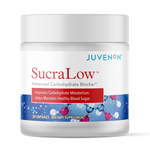
Also known as hyperglycemia, high blood sugar is a condition where the blood sugar content is too high due to insufficient insulin. High blood sugar is associated with diabetes and can lead to vision problems, rapid heartbeat, excessive thirst, and hunger, among other symptoms.
Blood sugar provides body cells with energy. However, too much of this glucose can be harmful. You may have hyperglycemia if you notice you’re unusually thirsty or urinating too frequently. Hyperglycemia could lead to severe health conditions when left untreated, so it's crucial to identify the condition.
Let’s look at high blood sugar: symptoms and causes.
What exactly is high blood sugar?
Your liver and muscles produce blood sugar. However, most of it is released from drinks and food containing carbohydrates. Once released, the insulin hormone directs body cells to take up and store glucose. Your body needs insulin to maintain blood sugar levels in an optimal range. The body's blood sugar builds up when your insulin isn’t working correctly or sufficiently. When left unaddressed, this high blood sugar results in multiple health problems.
Who should have their blood sugar routinely checked?
Even without showing any apparent high blood sugar symptoms, it's advisable the following groups of people get screening for high blood sugar:
- People with a BMI of 25 and above, regardless of age, especially with additional risk factors. These include heart disease, family history of diabetes, high blood pressure, and non-typical cholesterol levels.
- For any person older than 35, if results show normal sugar levels, it should be repeated after every three years.
- Women with gestational diabetes
- Individuals with a diagnosis of prediabetes
- People living with HIV
High Blood Sugar: Symptoms And Causes
It’s imperative to identify high blood sugar: symptoms and causes when you have type 1 diabetes. When people with type 1 diabetes have untreated high blood sugar, they can develop toxic acids known as ketones in the blood.
1. Symptoms Of High Blood Sugar
Symptoms of high blood sugar tend to develop slowly, especially in people with diabetes. Some people do not experience these symptoms until their sugar levels are very high. Symptoms include a dry mouth and increased thirst, frequent urge to urinate, fatigue, recurrent infections like thrush, skin infections, and bladder infections, blurred vision, unintentional weight loss, and slow-healing sores and cuts.
Sometimes the high blood sugar levels may lead to the production of ketones, a severe medical condition requiring urgent medical attention. Symptoms of ketoacidosis include fruity taste in mouth or smell on breath, shortness of breath, vomiting, dehydration, disorientation and confusion, and coma.
2. Causes Of High Blood Sugar

High blood sugar: symptoms and causes are triggered by various things. Some of the common triggers and causes include high-stress levels, sedentary lifestyle and lack of exercise, common illness like a common cold, over-eating, missing diabetic medication doses or taking the wrong dose, dehydration, medication like steroid medication, endocrine conditions like Cushing syndrome, pancreatic diseases, and trauma or surgery.
Causes Of Hyperglycemia in Diabetes Patients:
Diabetic patients are most prone to high blood sugar, often caused by the following:
- Insulin medication is not suitable for your needs.
- Intake of carbohydrates does not match the amount of insulin injected.
- Inactivity and lack of exercise.
- Physical stress, such as an illness, infection, or cold.
- Emotional stress.
- Effect of a surge of hormones produced every morning, also known as the dawn phenomenon.
People under the following categories have a higher risk of contracting hyperglycemia.
- A family history of Diabetes (type 2)
- Have high cholesterol or blood pressure
- Are Overweight
- History of Gestational Diabetes
- Polycystic Ovarian Syndrome
Maintain Healthy Blood Sugar
To help maintain healthy blood sugar, take SucraLow by Juvenon. The supplement contains ThymoQuin, a breakthrough ingredient that boosts your beta cell levels, giving you balanced blood sugar and insulin sensitivity.
With SucraLow by Juvenon, you’ll experience more balanced blood sugar. An added benefit is that it will also jumpstart your metabolism leading to increased energy levels and endurance.
For optimal results from SucraLow, follow the following
- Increase your activity level.
- Take SucraLow daily. Follow a diabetes meal plan.
- Regularly check your blood sugar levels.
More Ways To Control Blood Sugar Levels
If you risk developing high blood sugar, some lifestyle changes can help you prevent hyperglycemia.
- Regular exercise. Regular exercise helps improve insulin sensitivity. Through this, your cells can use the sugar in your blood better.
- Manage your carb intake. Taking low-carb diets will prevent constant spikes in blood sugar levels.
- Consume more fiber. Eating more fiber slows the digestion of carbs and absorption of sugar. It promotes a gradual increase in blood sugar rather than spikes.
- Drink a lot of water. Taking water helps your kidneys flush out any excess sugars.
- Portion control to help manage the calories you consume daily. Moderate portions control your weight, which fosters healthy blood sugar levels.
- Stress management and rest. Implement relaxation techniques, exercise, and meditation to manage stress. Stress levels affect your blood sugar. Lack of enough rest and poor sleeping habits promote weight gain and increase appetite, affecting your blood sugar. Get enough sleep to prevent an increase in cortisol levels.
- Eat foods rich in magnesium and chromium. High blood sugar has been linked with dietary deficiencies in minerals like magnesium and chromium that regulate blood sugar. Take chromium-filled foods like vegetables, fruits, nuts, and meats. The dark leafy green vegetables, tuna, pumpkin seeds, bananas, and beans for magnesium.
Seek Treatment For High Blood Sugar
Having high blood sugar can be a daunting experience. However, knowing the symptoms can help you mitigate them early enough. Implementing lifestyle changes can also help you alleviate many of the symptoms resulting from high blood sugar.
What you eat will directly affect your blood sugar, so invest in a healthy blood sugar-friendly diet plan. When seeking treatment, ensure your medication suits your blood sugar needs. Seek the help of a physician in case of any adverse reactions or no sign of improvement. It may be difficult, but all is well; with the right help, you can regain control over your blood sugar levels.






















